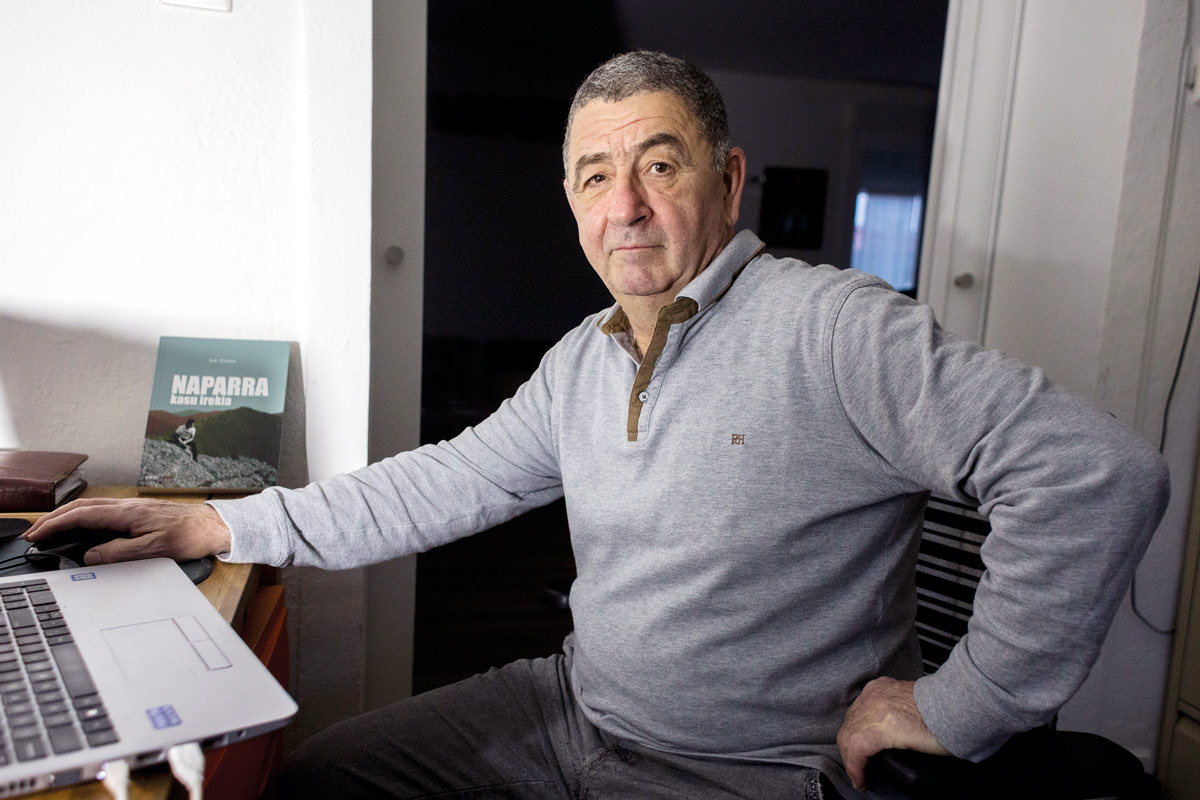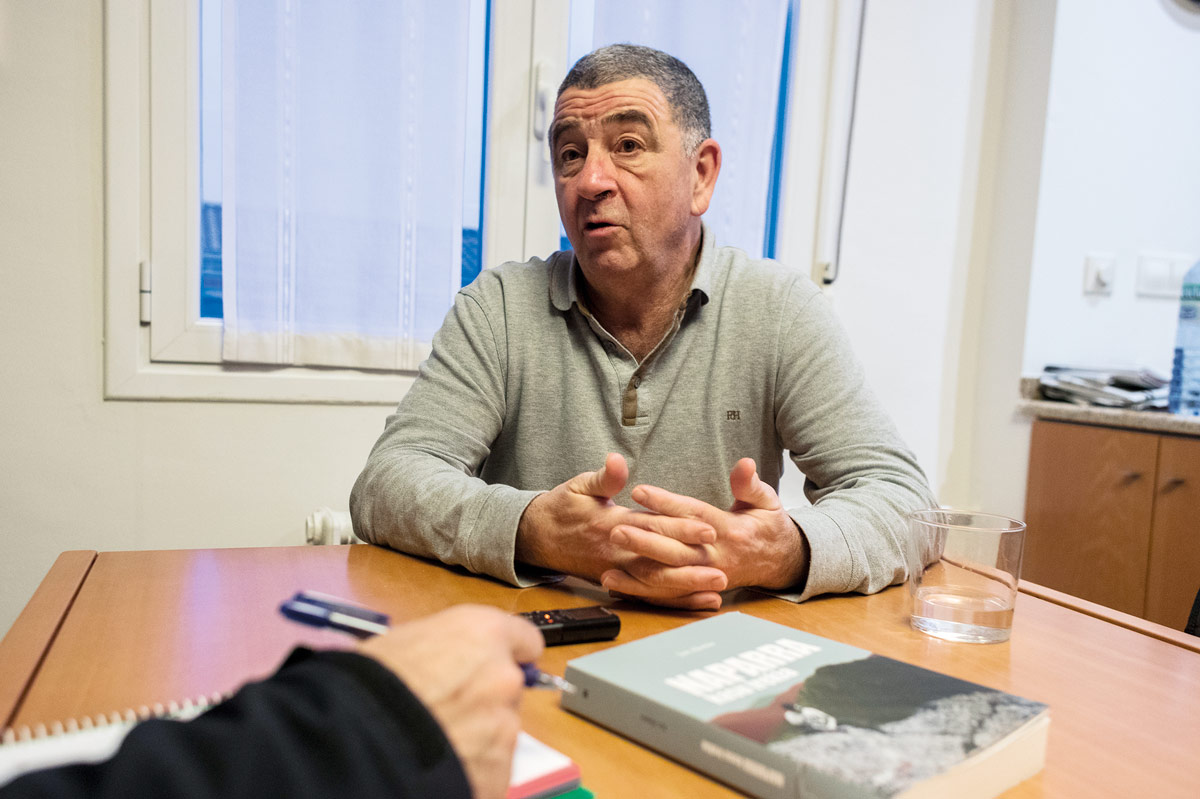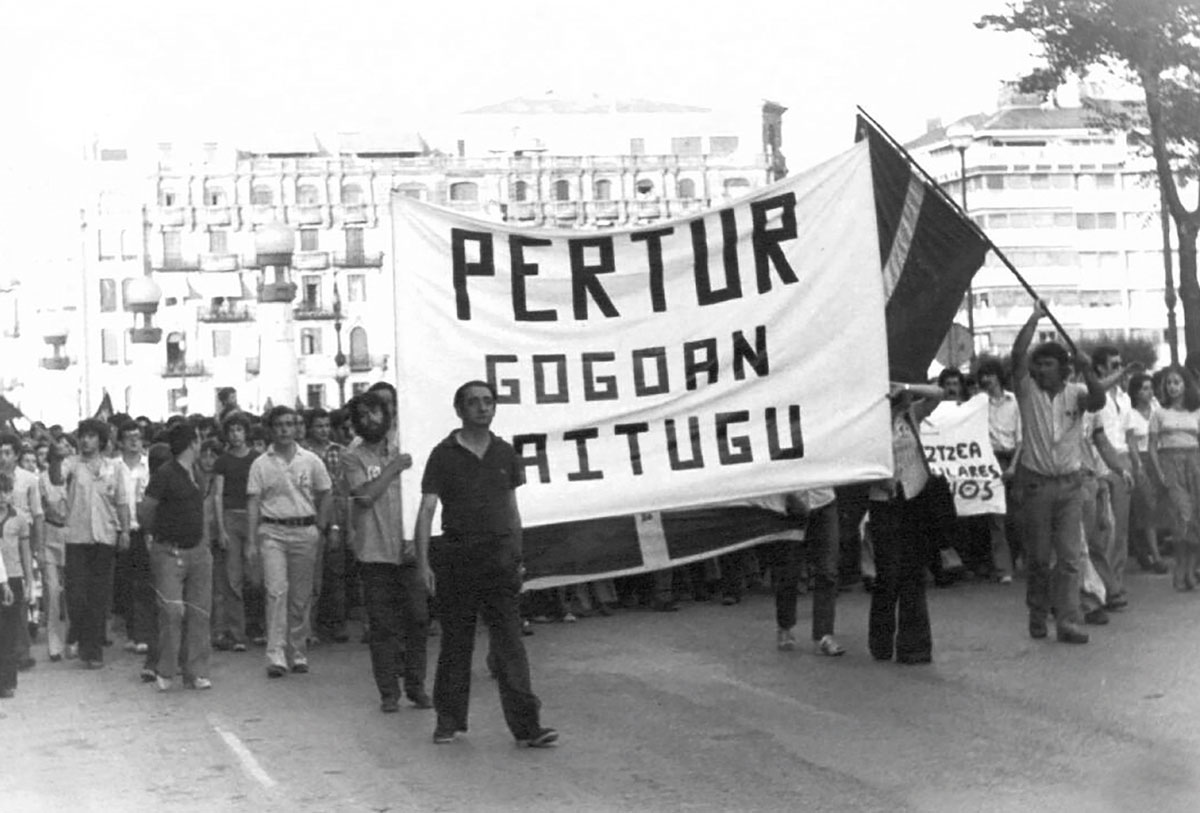"The family always looks for José Miguel, that's a constant torture."
- Naparra. Jon Alonso (Pamplona, 1958) wrote the book The Open Case (Elkar) to investigate the case of the disappearance of José Miguel Etxeberria Naparra. The neighbour of Pamplona disappeared in 1980 and his family is still looking for the victim, who disappeared in 1980. The book does not provide new clues to clarify the case, but with a four-year investigation, it collects all that is about the case, dedicating a significant copy to the memory of the conflict. The case will become an indispensable reference for anyone who wants to follow the adventure.

What drove him to write the book? You were also friends of children.
His youth crew was another. As a child, we've been classmates. So I met him and then they disappeared. In addition, when we now talk so much about those times and the story, this case, despite being alive, falls a bit apart. Since I'm also a writer, I thought someone had to tell the Naparra case, I thought I could take advantage of it.
He's spent four years writing the book. Which body has left you? How did you stay?
The essence of the book, the most important work, I did in the first year and a half. Over the next two years, we've been waiting for what was going on in the search for Mont-de-Marsan, but because it's an open case, new things happen and you're always renewing the book. How I stopped ... it is a terrible thing, there have been great evils in this country and it is not a happy subject. On the other hand, you see the family, always facing the issue, and that also generates admiration.
You also wanted to end the book with optimism and in the end you mentioned six lines of work that are still open in the case.
Yes, it is an open and therefore difficult case, but let us think that one day we will know what happened and we will find the remains.
Do you see any one that's stronger on these lines?
I believe that this excavation should be done as soon as possible in the vicinity of Brocas in France. In 2017, the place called B was registered and, since then, the family is waiting for the exploration of the A. It has been two years since the court case was filed, but it has not yet been done and it is essential to do so as soon as possible to see if it is there and to close that chapter. In addition, for the family is suffering so long waiting, the revictimization is evident.
The CESID (former secret service of Spain), Arnau de la Nuez, made these places known, has now disappeared, but who knows if it can reappear. In Ziburu there was also a corpse along the tracks of the train where he was going to undergo DNA tests. The same was a corpse that appeared in Cauterets. If Spain’s law on official secrets is ever amended, new information may also appear...
Both Eneko [brother of Naparra] and you see the need to change the law of official secrets in order to resolve the caso.Hace lack conditions in which the State
would be willing to recognise the existence of state terrorism. Today we are a long way from that. The remains of the Civil War also appear 70 years later.
You say in the book that these cases are written in the sewers of the States.
This is what the experts tell me in the conversations. For example, Paco Etxeberria [medical case] says that in such cases there is always a written track. But, of course, that is why it is essential to change the law of official secrets, and even if it is modified ... At the request of the PNV, Congress authorized the modification in 2016, but since then the PSOE and pp have always blocked the change.
When draft laws are being drafted, amendments can be tabled, and these aspects do not cease to amend the draft bill, thus delaying the drafting of a new law.
Now the PSOE, the United Nations Podemos and, to put it another way, the “perificity” keeps the Government of Spain. Can the extension of this kind of government lead to the amendment of the law?
Yes, it may be, but even if this government goes ahead, among other things, when we are facing a pandemic, the issue of pensions, retirements ... I do not think it is an issue that is clarified among its priorities.
Let us go to the bottom of the matter: Who has and has made José Miguel Etxeberria disappear? There are three theses: one, they were autonomous, but it was discarded soon; two, it was ETA, the thesis was very strong and still some believe it; three, the Basque Spanish Battalion (BVE) police group, is the most accepted hypothesis today. You voted for the latter. Until you really
know what happened there will always be time for speculation, and I respect other views, but I think it is clear that it was BVE. I think there's a lot of indirect evidence to say that.
First, the claim; then the investigations carried out and published by several journalists; the attitude that has historically adopted justice before the family (even denying that we are faced with a case of disappearance, until recently, and hindering many of the actions of the family), if any, seems to me to be an indirect proof; the testimony that the family of several militants has received; the importance of the Brigade of Involuntary Deseristas…
We have a lot of indirect tests to think it was BVE. I regard the opinions of others as respectable, I do not want to convince anyone, but those who say that it was ETA only have opinions and suspicions.
At the end of the first part of the book, you ask yourself: Why Naparra? Were you unlucky enough to meet the Autonomous Commands? Coincidence?
It was probably the sum of several situations. Recently, a self-employed person at the time repeated to me that Naparra was little as a military destination, that in Iparralde there were people much more significant than him. But BVE also had at its disposal the meetings with the Warriors... Were Lasa and Zabala also of military importance? With the death of anyone, fears and confusions were also generated among the refugees.
Moreover, after talking to several freelancers, it seems that Naparra became a reference among them, who wanted to organize autonomous commands, which had a certain theoretical capacity. Remember that he also had another nickname: Bakunin. So why him? The sum and bad luck of many circumstances.

Naparra is now involved in cases of parapolice violence in the Basque Parliament and in the Navarre Parliament, but they had to spend 25 years from the institutions to contact the family. It is said tirelessly and it does not leave our institutions in a good place. How do you understand this?
In general, it seems that the issue of victims was very stagnant until the rights of victims began to vindicate. Recognition and aid were, of course, initially targeted at the victims of ETA. To the family of Naparra, the Spanish State has twice denied recognition as a victim. Political conditions have been changing, and part of society and some political parties have had minimal recognition for other victims.
And yet, after 25 years of progress, some parties have resorted to the laws that have been drafted in the legislative assemblies to make this recognition possible.
If I am not mistaken, in 2007 the authorities for the care of the victims of the Basque Government contacted the family to include it in a list of victims of the state or the police force. But no official confession had yet been made. The first organization to do so was the UN, created by the Group of Voluntary and Violent Disorders. In 2018, it was also discovered that Naparra had no outstanding causes at the Spanish National Hearing.
Yes, it is. In this regard, I believe it is worth reflecting on the democratic deterioration that has occurred in society over time. 35 years ago, all Democrats thought that all people had rights, despite belonging to the armed organization. Today, it seems that with a member of an armed organization, you can do whatever you want, and if you argue that you don't, you're practically making apology for terrorism. It is therefore very significant to note how, today, the members of the UN Eviction Group repeatedly recall that there is no right to eliminate anyone, regardless of whether this person has done anything.
And in addition to everything we are saying, the family also suffered the sectarianism of some sectors of the Abertzale left. This also caused great pain to the family. You've also worked with a critical perspective on this in the book. The
family has always had the help of people from different sectors of the Abertzale left. What happened? On the one hand, some of the Autonomous Commands denounced that ETA was ETA; on the other, ETA said that “this was not gutarra, so this is not going with us.” The family just wanted José Miguel to appear, so being out of the competition between ETA-Autonomous Commands was uncomfortable for them. The family, uncomfortable for the two poles that collided, was abandoned.
Naparra is a victim, but he is also a victim of his family, according to the institutional protocols of the disappeared. You too, in the book, talk a lot about the suffering and admiration of the family. International law
is clear on this and the UN maintains it. The Member States sign the treaties of these organisations, but then they do not listen to them. The UN Disappearances Working Group, to which we have referred, celebrated 40 years in 2020 and invited the Naparra family to Geneva for the celebration event. There were no representatives from France or Spain. If they had nothing to hide, they would leave and make the corresponding confession and reparation to the family.
Father, mother, brother... always looking for José Miguel. That is constant torture. Whoever follows the case and knows it can also disconnect it in a moment, but the family does not. Now, for example, two years have passed since the family filed the second search request in the Mont-de-Marsan area and it still has no response from France. That is criminal.
In the book he mentions two people close to Naparra: one, an autonomous person who lived with him when he disappeared, and the other, an ETA militant who was cited. He has tried to talk to them, but he has not succeeded. Do you know if anybody did?
I do not know if the one who had the appointment has ever said something. On the other hand, Naparra lived in different places and with several roommates… It is a question that some have not wanted to talk about the case, at least with me. I have not pressured anyone either.
He also reflects on the stories at the end of the book. What is remaining about the Naparra case in Basque society?
It is not a topical issue, but it is still an open case. From the family, there are people working to bring to light our truth or our belief. The Social Forum speaks of the inclusive narrative, that is, of the approach that takes into account all the stories, but today it is not. Still, this case has been presented to a part of the political arena and they will not allow the state to have anything to see, or refuse to have it disappeared, who knows, so they will not accept that the family is a victim, that needs reparation ... I theoretically agree with the inclusive story, but then, in this case, where is that inclusive story?
“It makes me sad that this book is no better writer than me.” Why do you say that?
Because maybe a better writer would better express what the familia.No lives is easy to try to put words into that feeling. I have tried to explain in a number of ways what it has to be and in so many sessions something will remain, but surely a better writer would have done better.
As usual, you dedicate yourself to literature, sometimes to essay, now to journalistic research. Where do you work more comfortably?
Writing about such a case has much more commitment than fiction. In fiction you always have to say... “But this is a story, a novel, an imagination.” Here we're talking about people who live, people who have had a relationship with the case, and that's more engaged.
The burial of their dead is one of the ways to make peace with the past. Another, but in the long run less effective, is the forgetfulness of the past. But sometimes apologists forget the forgetfulness that everyone has to forget their unburied dead (or learn to forget them, or... [+]
Joxe Bernardo Bidaola Txirrita etakide tolosarraren desagertze eta heriotza ikertzen dituen liburua aurkeztu dute, egilearen opariz ARGIAk PDF formatuan hemen eskaintzen duena. Ander Lizarralde oñatiarrak bildu ditu 1976ko apirilaren 25ean Txirritarekin zihoazen lekukoen... [+]


















